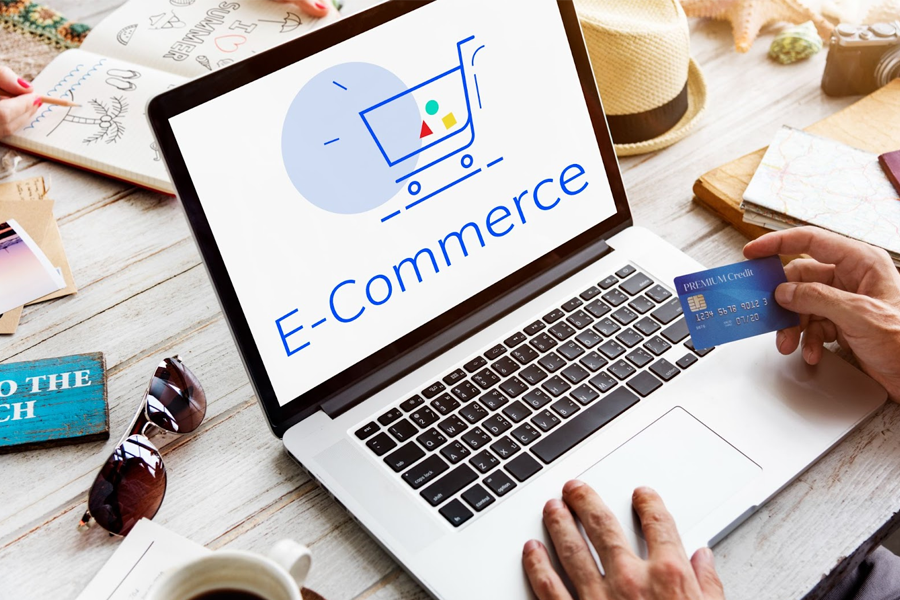
Online shopping has been the trend these past few years. It was already a thing before in the business landscape but has been boosted by the pandemic years. So, ecommerce businesses sought the opportunity and started to grow over the recent years.
The transition from buying from brick-and-mortar stores to ecommerce platforms has been gaining traction a lot now, especially in India. India’s ecommerce industry is projected to reach over USD 300 billion by 2030.
You are never too late to start your own ecommerce business in India. In fact, many modern tools and solutions will make your endeavor as swift and effortless as possible, giving you the opportunity to grow quickly without huge investment.
Start now and be among the many successful ecommerce businesses you know today!
What You Need to Know about the Indian Ecommerce Landscape
The Indian ecommerce market is rapidly skyrocketing over the years. It is making its way to reach among the top 10 countries with fastest-growing ecommerce sales.
Last 2023, it ranked top six (6) with 15% retail/ecommerce growth sales, topping Russia, Japan, China, etc. By unlocking India’s full potential in the ecommerce industry, the economy can encourage more ecommerce businesses to start and flourish.
If you are a budding entrepreneur who wants to start an e-commerce business in India, you must start researching and creating marketing strategies and business plans.
Overview of the current state of ecommerce in India
Last 2023, India was among the top 10 countries recognized as the fastest-growing retail/ecommerce country.
Some of the factors that are considered for this enormous achievement are following:
- Increase in internet penetration;
- Increase in smartphone usage;
- Availability of mobile commerce;
- Rise of electronic commerce;
- More Internet service providers;
- Increase in online shoppers;
- Increase in Internet business;
- Increase in logistics partners and logistics service providers;
- Increase in online store owners.
With more Indians gaining access to the internet and embracing digital technology, the shift from physical stores to business online has seen a significant rise.
Most ecommerce businesses have gained traction over the years because of this exposure to a much bigger audience. So, if you want to earn a decent amount of money with your passion for business, you can start to sell products online and high retail or ecommerce sales.
Growth and Potential of the Indian ecommerce Market
This year 2024, the Indian ecommerce market is estimated to reach over USD 112 Billion and is expected to reach over USD 300 Billion by 2030. This just shows that the Indian ecommerce landscape has great growth potential and can compete with bigger countries in the United States and Asia.
Digital transactions like net banking and other online payments also help the e-commerce industry to boost and seamlessly connect with the customers.
Popular Ecommerce Sectors and Trends in India
There are many sectors in the Indian ecommerce marketplace, with vast categories to choose from. In this case, you need to do really deep research to find the perfect sector for you.
In the meantime, here are the popular ecommerce sectors in India:
- Electronics: This sector is one of the major sectors in the Indian e-commerce market. It generates high sales and is composed of a wide range of products from smartphones, laptops, TVs, electronic accessories, computer parts, etc.
- Fashion: Fashion and apparel are other high-generating retail sales in India. From women’s clothing to men’s clothing and even kid’s clothing.
- Beauty and Health: Cosmetics are also driving sales in the Indian ecommerce market. Skincare products, cosmetics, and grooming products are also good products to sell for first-timers.
- Groceries: Online grocery has been an in-demand sector ever since the pandemic, and now, some of Indian shoppers still prefer online grocery so you won’t have to worry if you have a target market for this sector because you sure do.
- Home Decors and Essentials: Homewares and aesthetic home decor have been a trend ever since the aesthetic ideas popped up at the peak of the pandemic. You can sell furniture, kitchen decor, kitchenwares, homewares, appliances, utensils, and others.
There are so many sectors that dominate the Indian ecommerce landscape. Trends like social commerce do help elevate social media platforms or ecommerce websites for buying and selling online.
Potential online customers are swarming, so you don’t have to worry about whether you have any target markets in a specific sector. All you have to do is have a good ecommerce site, business model, and marketing strategies.

How To Conduct Market Research and Identify a Niche
Marketing strategy like market research is important in starting your ecommerce business in India. Market research and identifying your niche serve as one of the foundations for understanding your ecommerce market landscape, identifying your customer’s preferences and needs, and identifying potential opportunities or big breaks for your business.
To conduct a market research, you need to do the following:
- Know the market dynamics: First, you can begin by doing your research and understanding the landscape. Every successful business owner did their research so you should too. Analyze the industry reports, trends, and market studies to understand the current standing or state of the Indian ecommerce market. Include who are the key players in the industry, the emerging trends, and growth trajectories.
- Identify your target audience: This is important. You need to define your target audience based on psychographics, demographics, and their purchasing patterns or behavior patterns. You need to understand their preferences and purchasing behavior to tailor your product offerings and marketing strategy.
- Benchmark competitors: Analyzing your competitors is not illegal. It is a smart strategy to identify gaps and opportunities in the market. Assess their pricing strategy, product offerings, marketing strategies, and customer feedback to differentiate your business and tailor your unique value proposition.
- Explore Niches: Hopping into niches with high competitors is fine but you might want to look for underserved and overlooked niches in the ecommerce market. Consider niche segments solely based on geographics, product categories, or unique customer preferences. Understand and evaluate the demand-supply and growth potential of each niche to determine which one suits you the most.
- Create a business plan: Validate your niche idea. Do market research techniques like surveys, social listening, or focus groups to see if your business has potential. Feedback is important so you must gather them accordingly.
- Evaluate profitability: Assess the profit potential of your chosen niche by analyzing factors like competition level, pricing strategies, market size, and cost structures. You need to calculate all potential margins and potential revenue profit to make sure that your business would be financially viable in the long run.
- Refine your niche idea: Continuously do research and revisions for your niche based on market feedback, and emerging trends. Stay flexible for evolving customer needs and market dynamics to create a competitive edge in the ecommerce market landscape.
- Create a UVP or Unique Value Proposition: Make your market research findings into a unique value proposition that would set your ecommerce business apart from your competitors. Highlight the unique features, benefits, and solutions that your online business offers to attract and create loyal customers.
By doing thorough market research and identifying a niche that best suits market demand and your business plans and goals, you can create a solid foundation for building your own online business or ecommerce store. Always remember to stay flexible for changes, proactive, and customer-focused to give the best customer experience.
Legal and Regulatory Considerations
When planning to start an entire online business like ecommerce, you need to take note of the legal and regulatory considerations you need to accomplish.
Even though you are planning to be an SME (small or medium enterprise) or a corporation, you need to ensure compliance to reduce potential risks. Below, you will find an overview of the important things you need to consider when starting an ecommerce business.
Registering your business entity and obtaining the necessary licenses
Registering your business and obtaining important licenses is an important step in starting your ecommerce business entity in India. First, you must identify which type of ecommerce business you are.
Here are the four major types of ecommerce business:
- Business-to-business (B2B): Business to business refers to the transactions between two businesses. In simpler terms, it is like one business sells its product or services to another.
- Business-to-consumer (B2C): This type of business means the transaction between a business where it sells its product or services to an individual consumer.
- Consumer-to-business (C2B): This business type is when consumers offer products or services to businesses. Consumers act as suppliers or service providers while businesses act as consumers.
- Consumer-to-consumer (C2C): This type of business refers to transactions that occur between consumers to other consumers without a business involved. An example of this would be second-hand selling to marketplaces or other ecommerce platforms.
To understand the process you should also consider the following:
- Choose your business structure: Before you register your business, you need to identify what your business structure is. Determine if your business would be a private limited company (Pvt. Ltd.), limited liability partnership (LLP), partnership, or sole proprietorship.
- Choose your business name: Choosing the business name that you will register is very important because this will be your brand and your legal business name so make sure that it is well-planned.
- Open your business bank account: Having a bank account for your business is important because some of the licenses or permits you will need require you to have a bank account.
- Register your business: Ecommerce businesses in India have to register under the Companies Act, 2013, or the Limited Liability Partnership Act, 2008. To register you will need an employer identification number or Director identification number (DIN), digital signature certificate (DSC), and filing incorporation documents or registering your company with the Registrar of Companies (ROC).
- Obtain the important licenses or permits: Some of the important licenses and permits you need include Business licenses like shop and establishment licenses, FSSAI licenses, VAT registration, Goods and service tax registration, and others.
If you’re unsure about the registration process and all the legal compliance for setting up your business in India, consider seeking professional assistance from legal advisors, company secretaries, etc. Asking for guidance and support ensures smooth compliance with your regulatory obligations.

Complying with tax regulations and GST (Goods and Services Tax)
Ecommerce businesses that exceed the prescribed threshold or amount of profit annually are required to register for Goods and Service Tax or GST. The threshold is based on the nature of your business and the state in which it operates. To register for GST, you must submit the necessary documents and information through the GST portal.
For sole proprietors and individuals, these documents include:
- Permanent Account Number (PAN) document;
- The Aadhar card of the owner;
- Photo of the owner (note* in JPEG format, 100 KB -maximum size);
- Bank account details;
- Address (proof that you are living in India).
For Partnership firms and limited liability partnerships (LLP) the documentation includes the following:
- PAN card of all partners involved;
- Copy of partnership deed;
- Photo of all partners involved;
- Address proof of all partners (Passport, driving license, Aadhar card, voter id ,etc.);
- Aadhar card for the authorized signature;
- Proof of appointment;
- *For LLP, registration certificate;
- Bank account details;
- Address or proof of place for the business.
To register your ecommerce business and be eligible to operate on online platforms and marketplaces, you need to present the following:
- PAN card;
- COI or Certificate of Incorporation;
- A voided cheque from your business bank account to verify the bank account;
- GST registration number.
GST compliance is really important especially if your business reaches and exceeds the threshold provided by the government. You must comply all the time to avoid potential risks that may harm your business online.
Understanding data protection and privacy laws
Data protection and privacy laws are essential in Indian ecommerce. You need to understand and leverage it to safeguard customers’s information and comply with regulatory compliance.
Here are some key considerations you need to know:
- PDPB or Personal Data Protection Bill: Personal Data Protection is under the Indian parliament and it aims to regulate the processing of individual data by businesses/ecommerce businesses and protect their privacy rights.
- Data security: ecommerce businesses are mandated to implement high-end data security to protect the customer’s data from unauthorized access or hacking, disclosure of information, etc. Data security includes encryptions, secure storage systems, access controls, and audits that you will conduct regularly to identify and address potential risks.
- Consent for data collection: Your ecommerce business should communicate your intention of collecting your customer’s data and for what purpose.
- Compliance and accountability: Your business should practice internal processes and controls to ensure up-to-date or ongoing compliance with privacy laws and data protection. Have your compliance team responsible for overseeing data protection practices or you can practice doing it yourself as a sole proprietor.
Every e-commerce store must be transparent and therefore must have transparent privacy policies that outline their handling practices. These handling practices include types of data collected, rights of your customers regarding the data, purposes of collecting, etc.
Privacy policies should be easily accessible to customers, written concisely, and understandable for any age.
Building an Ecommerce Website or Choosing a Platform
In building your e-commerce website, you need to know that two types of software solutions help online businesses manage their stores, orders, products, payments, and other business operations seamlessly.
These types are open-source and proprietary ecommerce platforms:
- Proprietary ecommerce website: Proprietary e-commerce platforms are software solutions that have their private source code protected by a company and cannot be accessed for free. Users cannot modify the platform and would have to rely on the features and services provided. Businesses like you should pay a licensing fee to use this software.
- Open-source ecommerce: An open-source e-commerce platform is a software solution that is available to the public and can be modified freely. You can modify the code and design the platform based on your needs and preferences. These are free to download and no licensing fee is involved.
If you choose to create your proprietary website, it involves developing your custom online platform tailored to your specific business needs and requirements. But, if you opt to choose an existing ecommerce platform to boost your online store, there are many popular stores out there, including NEXT BASKET.

Sourcing and Managing Products for the Local Market
Sourcing and managing products for the local market is important for running a successful ecommerce business in India.
To know how to effectively source and manage products, here are a few things you need to consider:
- Research for local manufacturers and suppliers: Start with sourcing out reliable local suppliers and manufacturers who have the products you intend to sell online. Find suppliers with a good background and feedback like a track record of reliability, quality, timely delivery, and trustworthiness. Establishing strong partnerships with your local suppliers is important to ensure a steady stock of inventory for your online store or ecommerce platform.
- Product quality and authenticity evaluation: After sourcing out your suppliers and researching their track record, now you must conduct due diligence to ensure that their products meet the regulatory requirements of industry standards. Look deep into factors like durability, material quality, packaging, permits, licenses, etc.
- Price negotiations: Negotiate your pricing terms with the local suppliers to secure a favorable deal and maximize your profit margins. Find competitive pricing while being true to product quality standards. Make sure to have a clear and concise agreement regarding payment terms, pricing, delivery schedules, order quantities, etc. to mitigate misunderstandings and disputes.
- Have a diverse product range: Make sure to offer your customers a diverse range of products. Always stay updated on the latest trends in the market, offer new products and seize opportunities.
- Implement effective inventory management: Optimize inventory management to forecast demands, and minimize overstocking or stockouts (out of stock).
- Compliance and regulations: Make sure to meet compliance and regulatory requirements when sourcing and selling products in your ecommerce store. Research the import/export regulations to avoid potential risks to your business. Always abide by the law and obtain necessary certification or licenses for certain products, to avoid legal issues.
- Organize product logistics and fulfillment: Create effective logistics and fulfillment processes to ensure the timely delivery of products to your customers across India and internationally. You need to research a reliable logistics provider to handle warehousing, shipping operations, and packaging efficiently. Give your customers an order tracking system and provide them with real-time updates about their orders.
Lastly, do not forget to monitor your customer’s feedback and always be updated on the latest market trends. Your customer feedback can help you improve areas that are lacking and improve your business operations. Stay updated about the latest trends, consumer preferences, your competitor’s activities, and industry developments to easily adapt your product sourcing strategy.

Payment Solutions In India
Payments and logistics solutions play a crucial role in every ecommerce company. To handle orders and payments for your customers in India, you need to choose a good payment service provider and logistics provider that can cater to a seamless shopping experience for customers.
Here is what you need to consider:
- Payment gateway integration: Ecommerce businesses need to integrate payment processing solutions into their business because this can facilitate online transactions by securely authorizing and processing payments from customers. You need to integrate a payment gateway to comply with the regulatory requirements and considerations like payment gateway compliance.
- Payment gateway compliance: Make sure that your selected payment gateway complies with all the necessary regulatory requirements or regulatory standards like the PCI DSS or Payment Card Industry Data Security Standard and RBI or Reserve Bank of India guidelines. Compliance with the law ensures secure transactions from these payment gateways.
- Multiple payment methods: Make sure to offer multiple payment options to your customers. Make sure to offer COD, Card transactions, E-wallets, etc. Make sure it has a unified payment interface UPI.
Some of the payment gateways that are used for online businesses include PayU, CCAvenue, Instamojo, Bill Desk, AirPay, JusPay, and others.
Always remember to choose a payment gateway that offers seamless integration to your ecommerce website. It should be well-documented and straightforward, allowing smooth online transaction processes.
Frequently Asked Questions
Do small companies need to register their business in India?
Registration for small businesses in India is voluntary and not compulsory.
What product is the most trending in India?
Electronics is leading as the most trending product to sell in India, followed by clothes and accessories, homewares, electronic accessories, personal care, beauty, etc. Just always make sure to research for the latest trends and incorporate the findings in your ecommerce business plan.
How do I promote my online store in India?
You can use traditional digital marketing activities such as social media presence and paid ads. On the other hand, you can put your efforts into search engine optimization (SEO) to make your products rank higher in the search engines for a more long-term result.